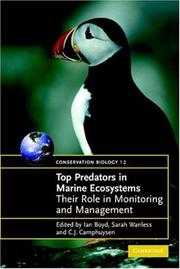| Listing 1 - 1 of 1 |
Sort by
|

ISBN: 9780521612562 9780521847735 052161256X 0521847737 9780511541964 0511191413 0511190018 9780511190018 0511191839 9780511191831 0511190654 9780511190650 0511190972 9780511190971 9780511191411 0511541961 9786610458523 6610458529 1107164494 9781107164499 1280458526 9781280458521 0511324235 9780511324239 Year: 2006 Volume: 12 Publisher: Cambridge, UK New York Cambridge University Press
Abstract | Keywords | Export | Availability | Bookmark
 Loading...
Loading...Choose an application
- Reference Manager
- EndNote
- RefWorks (Direct export to RefWorks)
The sustainable exploitation of the marine environment depends upon our capacity to develop systems of management with predictable outcomes. Unfortunately, marine ecosystems are highly dynamic and this property could conflict with the objective of sustainable exploitation. This book investigates the theory that the population and behavioural dynamics of predators at the upper end of marine food chains can be used to assist with management. Since these species integrate the dynamics of marine ecosystems across a wide range of spatial and temporal scales, they offer new sources of information that can be formally used in setting management objectives. This book examines the current advances in the understanding of the ecology of marine predators and will investigate how information from these species could be used in management.
Predatory animals --- Marine ecology. --- Prédateurs --- Ecologie marine --- Ecology --- Ecologie --- Prédateurs --- Predatory marine animals --- Marine resources conservation. --- Conservation of marine resources --- Marine conservation --- Marine environmental protection --- Marine protection --- Aquatic resources conservation --- Marine pollution --- Biological oceanography --- Marine ecosystems --- Ocean --- Aquatic ecology --- Marine predators --- Marine predatory animals --- Marine animals --- Predatory aquatic animals --- Ecology. --- Top predators --- Marine ecosystem management. --- Marine ecosystems management --- Ecosystem management --- Alpha predators --- Apex predators --- Carnivores, Top --- Summit predators --- Superpredators --- Top carnivores --- Top-level predators --- Upper level predators --- Upper trophic level predators --- Food chains (Ecology) --- MARINE ECOLOGY --- MARINE ECOSYSTEM MANAGEMENT --- PREDATORY MARINE ANIMALS --- TOP PREDATORS --- ECOLOGY
| Listing 1 - 1 of 1 |
Sort by
|

 Search
Search Feedback
Feedback About UniCat
About UniCat  Help
Help News
News